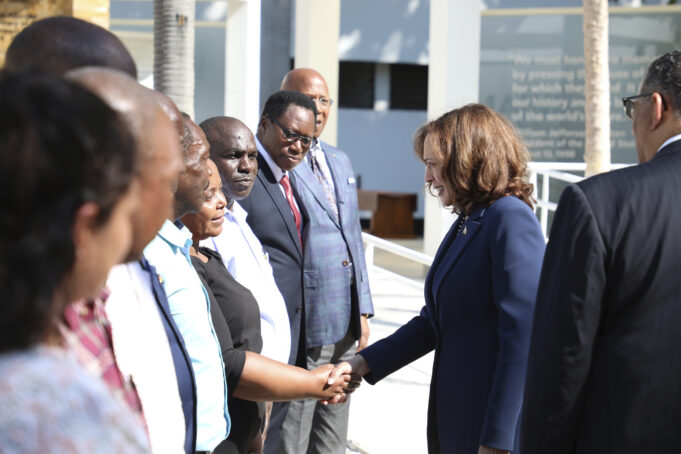Political analysts and observers in Africa are monitoring the 2024 U.S. presidential election and understand regardless of the outcome, many of America’s foreign policies are viewed with trepidation.
“While most Africans on the continent lean towards Democrats, they are very well aware that American policy is driven more by corporate financial interest and lobbying groups like the American Israel Public Affairs Committee (AIPAC) than by elected leaders, Redge Nkosi, told Africa Watch via email.

Nkosi, an economist and Pretoria-based founder and executive director of First Source Money and Public Banking of South Africa, was responding to questions about the election pitting Vice-President Kamala Harris, a Democrat against former president Donald Trump.
“… they (Africans) hold suspicious views about manifestos, speeches and promises made by candidates,” Nkosi noted.
Nkosi, who was a member of the Nelson Mandela administration, says, though “most Africans look toward Democrats” as opposed to Republicans, many Africans have been dismayed by the vice president’s statements regarding the genocide in Gaza perpetrated by Israel.
Israel’s war has resulted in over 42,000 mostly women and children killed in Gaza by the Israeli military, with U.S.-supplied weapons which “run counter to African psyche …,” Nkosi continued. “Her (Vice President Harris’s) stance on Israel stands in direct contrast with that of the ANC (African National Congress), the government of South Africa and many progressive thinkers and ordinary Africans,” he added.
In addition to Mr. Trump’s past expletives he made about some African countries, many on the continent are also worried about possible stricter migration policies or limited interaction or engagement by the next administration.
Neither Trump nor President Joe Biden traveled to Africa during their one term in office, although Biden may fulfill his “promise” to travel to Angola, which was postponed because of Hurricane Milton.
Regarding Trump’s possible return to the Oval Office, Etse Sikanku, a senior lecturer at Accra’s University of Media, Arts and Communication, told DW (Deutsche Welle), “Africa should be concerned about the possible return of Donald Trump to the presidency.” He attributed this concern to what he called Trump’s “ethnic nationalism.”
According to Sikanku, Trump does not “favor international cooperation with Africa.”
“This is someone who believes in isolationism in every respect, he looks more inwards,” Sikanku told dw.com. Though Biden, who withdrew his second-term candidacy in favor of his vice president, is more of a globalist, he argued that this has yet to translate to Harris.
The vice president did visit Africa in 2023 on a three-country “charm offensive,” designed to “woo the continent from China” the BBC reported.
According to the Brookings Institute, Harris’s arrival in Ghana on March 26, 2023, kicked off a weeklong three-country Africa tour, including Tanzania and Zambia. This was at a unique time in U.S.-Africa relations and the visit came in the wake of promises made at “the second-ever U.S.-Africa Leaders’ Summit,” held in December 2022.
The summit was the first tangible outcome of the Biden administration’s newly announced U.S. Strategy Toward Sub-Saharan Africa, which set the scene for the administration to reposition the U.S. as a valuable partner that reaffirms “African agency.”
But, according to the BBC, with renewed interest “comes a demand that Africa is treated fairly.”
The “scramble” for Africa is being framed by some media outlets as a “growing competition” that has come from other global powers, especially China and Russia.
Harris’s trip to Ghana came on the heels of a returning visit to China by Ghana’s Finance Minister Ken Ofori-Atta. Leading a delegation in Beijing, the finance minister posted on X, “So far, very positive and encouraging meetings in China,” expressing optimism that it would secure external assurances “very soon.”
Professor Bokpin explained that there is a “level of skepticism concerning heightened interest in Africa, which he said “is a belief that a new Scramble for Africa (and its natural and mineral resources) is in play.”
Harris and Trump are following a trend in the U.S. presidential race, well-known by many Africans, with neither candidate making U.S.-Africa relations a major campaign issue.
As the U.S. presidential race draws to a close, increasing geopolitical tensions and conflicts across Africa, the Middle East, Europe, and other places on the Earth suggest that whoever emerges as U.S. president will be sworn in on January 20, 2025, to try and “manage” more unprecedented global crises that have been faced in history.
Follow @JehronMuhammad on X.













